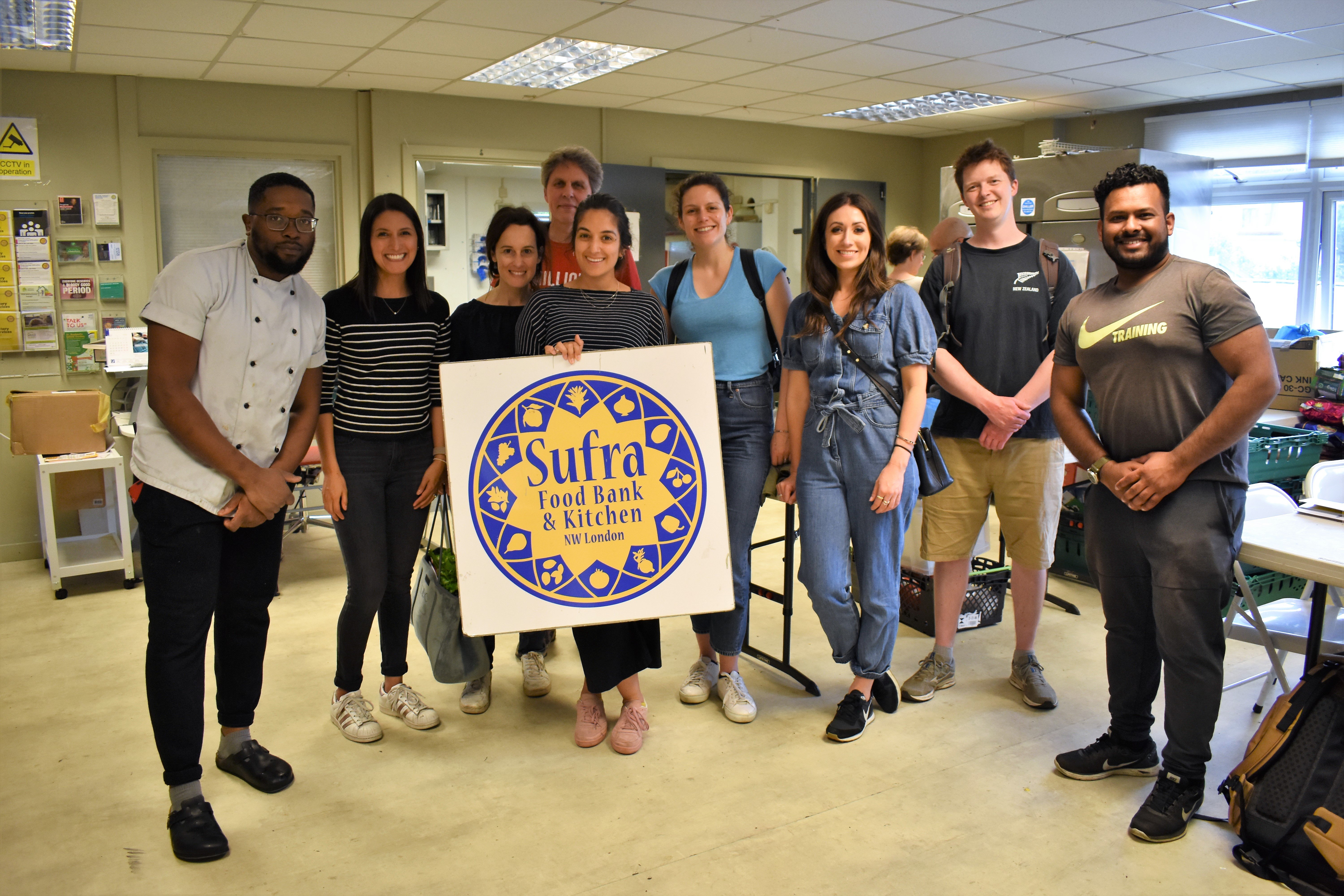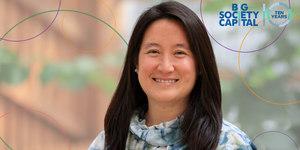It’s a question I’ve asked myself many times since joining Big Society Capital (BSC) over six months ago. To say it’s been a whirlwind of a journey so far would be an understatement. The sector has not always been accessible and prior to joining BSC I viewed the space as being exclusively for bankers and finance professionals with years of experience and inside connections.
Would I be accepted into the organisation coming from a diverse background, having worked on the frontline with a different type of lived experience?
My journey from the grassroots/frontline to the social investment world
Over the past five years I had come across the term ‘social investment’ and understood it in the most basic sense; a financial product that social purpose organisations could apply for to further their impact and scale. However, the sector itself has always had an air of mystery and intrigue for me. I never quite understood what took place behind closed doors.
What projects or communities are being impacted? Who is responsible for signing off social investment deals? And how are these crucial, impactful decisions made? These questions stemmed from my passion for addressing the inequality we see in society, the stories and events I’ve witnessed first-hand growing up in council housing, and the diverse range of people whom I grew up with in my working class community.
As a person of colour from a mixed heritage background, I never quite understood the value or ‘power’ of my lived experience. Born and raised in an inner-city council estate in North Kensington a stone’s throw away from Grenfell, I understood the importance of community but was also fast becoming aware of the stark disparities around race, opportunities, employment, and wealth.
Social mobility and inequality soon became topics close to heart. I was fortunate to gain frontline experiences working on international development programmes in the Philippines, South Africa and Pakistan to understand the impact poverty and inequality had on the livelihoods of people in local communities across the globe. My attention turned to my home city of London, working with a number of grassroots organisations to help understand the issues that young people faced in deprived inner-city areas. Institutions like the Young Foundation, social enterprises and charities like Uprising were the right fit for my ethics and values. Working at these organisations, I saw real impact on the lives of young people through skills and development training and how they nurtured young talented individuals to find their voice and make a difference.
I continued to build on my knowledge and understanding of the space through my undergraduate and then masters research on the impact that corporate social responsibility (CSR) and social enterprise have on marginalised communities in London.
However, there was always one challenge around funding that never ceased to amaze me. How are social enterprises and charities able to operate, serve the communities they support and continue to function to positively impact the people that relied on them the most? Enter the 2027 programme.
The 2027 programme is a competitive year-long placement and leadership programme for people who come from the frontline with lived experience who want to enter the world of grantmaking and social investment. Both sectors have had an historical challenge around representation and this programme seeks to address that. I never previously considered working in the space which I thought of as ‘gatekeepers of finance’. However, with a curious mind I applied as I was eager to gain fresh insights and expand my horizons. I was matched with Big Society Capital based on my knowledge and passion for social entrepreneurship and social impact, and to my delight successfully landed a role a few months later. I had not expected that I would be considered for a role here given my non-finance or investment background. This would be my first foray into this sector but I was excited nonetheless to transition from the grassroots to social investment.
Dispelling myths in the world of social investment
Walking into the office within the first few weeks did trigger ‘imposter’ syndrome as I felt eyes were on me and questioned if I’d be accepted or not. Sharing my (quite different) background to new colleagues, getting to grips with understanding the social investment landscape, reading countless reports and understanding where Big Society Capital fits into it – nothing short of being thrown into the matrix, quite literally.
As the months went by and to my genuine surprise, I was embraced and embedded into the organisation. I experienced a culture that was caring, supportive, considerate, and innovative. Terms I would not associate with a (somewhat) corporate financial institution. My perception of the space had changed for the better and I realised I was quite fortunate to not only witness a working culture like this but also be part of it and contribute towards its growth and success. Naturally, working in a positive-minded cultural workplace also attracts and fosters like-minded people. I felt welcomed by others who had a sincere interest in getting to know me better and helping me feel settled. I quickly realised my lived experience and background working on the frontline with social enterprises and charities was appreciated and respected as I was able to bring my own perspectives and insights into the organisation.
- Do I need to have a background in investment or finance to work in this sector? – No not necessarily, several people at Big Society Capital do not come from a financial background and are able to thrive by bringing in new experiences.
- Will I be accepted for who I am? – Yes, the culture at Big Society Capital is very inclusive and adjustments are made to support all individuals.
- Would I just be another number or cog in the wider system, what impact could I really make? – Certainly not, I have not once felt like a number. Since joining I’ve had the privilege to work across the engagement and investment teams and put myself forward to support initiatives and projects.
Inclusiveness and leadership at Big Society Capital
One of the main challenges I’ve faced since working at Big Society Capital , has been balancing my responsibility as a full-time carer (for an elderly family member ) whilst delivering on all workstreams, learning about this sector, and engaging with colleagues and projects across the organisation. At times it has been a real struggle and initially I was anxious about whether there would be support for carers like myself and if Big Society Capital could accommodate my work pattern and extra responsibilities. I feel very fortunate and lucky to have a manager like Amir Rizwan who has not only been integral to my knowledge and skills development at Big Society Capital but has also acted as a coach to support me in my role and allow me the flexibility to work around my caring responsibilities. Being line managed by someone who has a vested interest in your progress, takes an empathetic approach to your personal situation and opens doors for you to thrive in a new work setting is invaluable. It also displays a progressive leadership approach, one that recognises the value of a nurturing environment that engenders goodwill, which in turn gets the best out of its employees.
Conversely, as part of Big Society Capital's Equality, Diversity & Inclusion plan, the organisation has taken a reflective lens on how to review its internal behaviours and culture through higher levels of employee engagement. Big Society Capital understands it does not have all the answers to internal challenges and therefore has piloted a reverse mentoring programme which I’ve been able to partake in. The aim is to provide senior members of staff the opportunity to be mentored by those from different lived experiences and backgrounds. I’ve had the chance to mentor our Chief Investment Officer Jeremy Rogers over the last six months and found the experience really useful by sharing my own personal and often frank opinions on the organisation, the operations and what could be done to improve our mission and impact going forward.
Externally, I believe it’s important to gain insights and advice by individuals outside of the business and through the 2027 programme, I was able to put a request in to be personally mentored by Danyal Sattar. This proved to be invaluable for my personal development in the social investment space, to receive wisdom and guidance from someone so knowledgeable and experienced in the field was inspiring. It also provided me with the confidence and understanding of how I could make an impact in the sector and opened my eyes to an array of opportunities in the space.
Further to all the varying support that I’ve received, I’ve also felt empowered to organise and lead several volunteering opportunities with some frontline organisations doing amazing work in local communities. So far, I’ve supported over 30 Big Society Capital staff members to actively take part in volunteering with Whitechapel Mission in East London preparing and cooking breakfasts for up to 300 homeless and displaced and at Sufra Food Bank in North-West London where we helped prepare meals and tend to the community garden for the locals. To have the agency and support to initiate these opportunities is not only fulfilling but also creates an inclusive atmosphere where you’re able to be yourself and create your own impact.

The fire from within
Despite the positives of working in this sector, there is still much work to be done to ensure this space is reflective of the messaging that is being communicated around equality, equity and inclusion. The recent Adebowale Commission report on the future of social investment raised several recommendations around the fairness of social investment in supporting the growth of social enterprises and whether funds are reaching groups and communities that are often overlooked. Recent reports including ‘No Going Back: The State of Social Enterprise 2021’ have highlighted the reality that organisations led by people from racialised communities, as well as women-led and those led by people with disabilities face disproportionate barriers to accessing social investment. This is an acute issue the sector needs to investigate and do more work in, not only to understand why this is the case but more importantly help focus on solutions. Internally within the sector, great work is being carried out by initiatives such as the Diversity Forum who are on a mission to drive inclusive social investment in the UK, through the convening of sector-wide groups, commissioning research, and knowledge sharing.
As part of the Good Finance team, I’ve been able to utilise my lived experience to help lead on a vital piece of work called ‘Addressing Imbalance’ with Olivia McLoughlin. This programme was created from the inequality and imbalance seen in the sector (mentioned earlier) as a practical response to the frustration felt around these barriers. The objective is to listen and learn from diverse leaders and networks and provide tailored resources and support to empower them to make an informed decision when considering finance options for their organisations or communities. Being part of this work allows us to connect with grassroots organisations who come from backgrounds like my own and is incredibly rewarding to know our efforts are supporting some of the most marginalised in our society. Further to this work, I’ve also been managing a podcast series called ‘Hidden Voices’ where we feature diverse founders and provide a platform for them to share their personal journey in social investment and to inspire others with the impact they are making.
However, there are significant structural and systemic issues that exist at the highest level, and this is evident from Investment Committees who make decisions on who should receive social investment. To challenge the current norms, another project recently created is the ‘Investment Committees of the Future’. This unique initiative seeks to address the issue of having diverse individuals with lived experience on investment committees and aims to create best practice to ensure decisions that are made are fair, representative and well balanced.
Projects and initiatives highlighted above are very important to ensure this sector is as accessible and equitable for all, as long as there is a will and fire from within, change will happen.
The road ahead….do I belong in this space?
From being flung into the deep end of social investment, and carefully wading through the countless reports, training sessions and concepts that I’ve come to grips with; could I see myself continuing to push forward? I believe that would be a resounding yes.
I’ve come to the realisation that the world of social investment is right for me. I’m able to bring diverse perspectives and a fresh outlook on challenges we face in this sector and how to be unified in our attempt to address them. I would welcome others to come forward and put social investment on the map as a space to consider not only as a career but also as a useful tool to further social impact in the UK.
If you would like to learn more about my experience at Big Society Capital or my time on the 2027 programme, which I would highly recommend you apply for if you were thinking of a career change or dive into this sector then please feel free to get in touch.


